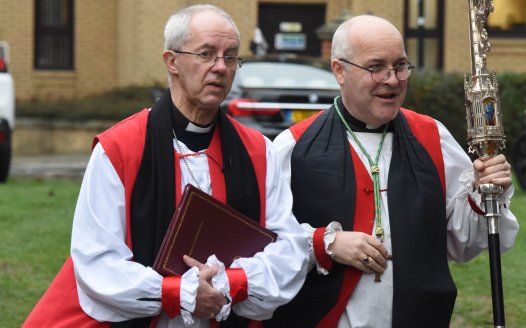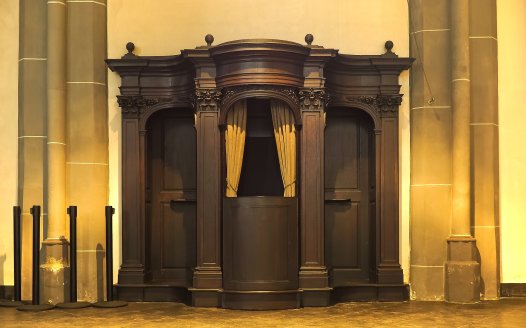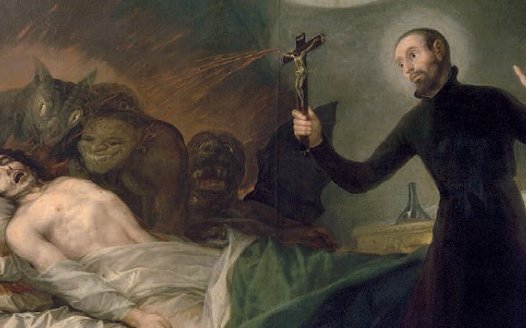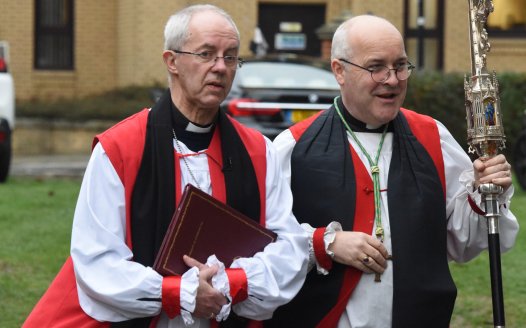The seal of the confessional and child abuse: a religious privilege too far
Posted: Mon, 25th Jun 2018 by Richard Scorer
Some clerics want exemptions from reporting requirements on abuse when it's revealed in the confessional. Accommodating their demands would undermine efforts to tackle child abuse, says Richard Scorer.
The controversy over the seal of confessional in clerical sex abuse cases has become a flashpoint for competing views of the proper relationship between church and state. Are the churches entitled to uphold the seal of the confessional in all circumstances, including where the penitent reveals information which, if reported to the statutory authorities, might protect children from abuse? In Australia, a senior Catholic archbishop encapsulated the official Catholic position on the controversy when he tweeted that "Western governments are increasingly reaching into areas which in the interests of religious freedom and the rights of conscience were long thought no business of government". This, he claimed, amounts to "an attempt to renegotiate the church/state relationship".
In the Catholic Church the seal of the confessional places an absolute duty on priests not to disclose anything that they hear from a penitent during sacramental confession (i.e. the formal sacrament of penance). The canon law of the Church of England also contains the following, intended to safeguard the sanctity of the confessional:
"If any man confess his secret and hidden sins to the minister, for the unburdening of his conscience, and to receive spiritual consolation and ease of mind from him; we… do straitly charge and admonish him [i.e. the minister], that he does not at any time reveal and make known to any person whatsoever any crime or offence so committed to his trust and secrecy".
Church of England guidelines on clergy conduct published in 2015 state that if the penitent discloses a serious crime, but refuses to report it to the authorities, the priest should withhold absolution. In fact in the Church of England sacramental confession is a minority practice, largely confined to the Anglo-Catholic wing. Also, since the Reformation there has been some ambiguity about whether canon law creates an unqualified seal of the confessional: the famous 17th century English jurist, Sir Edward Coke, considered that the seal did not apply in cases of high treason. Interestingly, Coke's interpretation indicates that the argument that there should be exceptions to the seal is not new. But across the Catholic Church and in some parts of the Anglican Church, the inviolability of the confessional is a jealously guarded principle.
In Ireland, mandatory reporting of child abuse was implemented in 2012 in the shape of the Criminal Justice (Withholding of Information on Offences Against Children and Vulnerable Persons) Act. Under the act priests are "mandated" persons, obliged to report concerns about abuse. The act does not allow for confessional privilege and when the bill was proceeding through the Oireachtas (the Irish legislature) the then justice minster made it clear that mandatory reporting would apply "regardless of any internal rules of any religious grouping". However in 2018 the Irish Catholic Church's National Board for Safeguarding Children advised priests not to pass on to the authorities any information about child abuse which they hear in the confessional – thereby advising priests to break the law.
In Australia, the Royal Commission into Institutional Responses to child abuse recommended in 2017 that it should become an offence to fail to report that a child is at substantial risk of being abused, and that such a law should apply to clergy even if the information was imparted in the confessional; in other words, that clergy should be treated in exactly the same way as other mandated reporters. As our president Keith Porteous Wood explained, in arriving at its recommendations the commission carefully considered the issue of freedom of religion and concluded that the mandatory reporting obligation does not infringe this: the free practice of religion is not an absolute right and can be reasonably abridged to protect the "fundamental rights and freedoms of others".
The mandatory reporting proposal awaits final agreement between Australian states before implementation. But in responding Australian Catholic bishops have stated, rather hysterically, that any softening of the seal of the confessional would be an unwarranted attack on religious freedom, that priests will go to prison rather than comply with such a law, and that any priest who did comply with it would be excommunicated. In trying to justify this position, the Australian Catholic bishops' office claimed that there is no compelling evidence that removing the protection for confession would improve child safety, and that attempts to remove the seal of the confessional in respect of child abuse were a "distraction".
In the Church of England, responses to the controversy have been more mixed. During recent hearings of the Independent Inquiry into Child Sexual Abuse (IICSA), some senior church figures tried to defend the sanctity of the confessional, while others seemed open to change. Official Church of England pronouncements – for example the recent one from the diocese of Canterbury that information about abuse imparted in the confessional may have to be reported – seem intended to defuse external pressure on the church whilst leaving the existing canonical provisions in place (a stance which perhaps mirrors the Church of England's general approach to safeguarding – give the appearance of taking it seriously, whilst avoiding difficult issues of principle).
What does the evidence tell us? There is ample evidence that many disclosures of child sex abuse are made in confession which, if they had been acted on, could have prevented subsequent abuse. By disclosures I mean by victims, by abusing priests, and by third parties; all these have featured in known cases involving the cover-up of clerical sex abuse.
So far as victims are concerned, in my book Betrayed I wrote about the case of Father James Robinson, a priest of the archdiocese of Birmingham who was jailed in 2010 after decades of sex offending. One of his victims disclosed to three other Catholic priests in 1972-73 that he was being sexually abused by Robinson. All of these disclosures were made in confession but were never acted on, allowing Robinson to continue to abuse children for another thirty years.
However, the role of the confessional in regard to disclosures by perpetrators may be even more significant. This aspect has been analysed by Dr Marie Keenan, an Irish academic whose book Child Sex Abuse in the Catholic Church: Gender, Power and Organisational Culture is probably the most comprehensive study of the subject ever published. Keenan has spent decades interviewing clerical sex offenders and trying to unpick the cognitive distortions underpinning their offending, and the ways in which the culture of the Catholic Church itself contributes to the problem.
Keenan found that eight of the nine clerical sex offenders who participated in her main study had disclosed their sexual abuse of children in confession. The confessional, it transpired, was their main place of respite and support from their "emotional conflicts and loneliness". Several of them explained to her how they used the confessional to cope with their abuse of children, and thus to facilitate it. As one told her: "The only ones who would have sensed what I was going through were my confessors – they were carefully selected by me, and time and time again I recounted my temptations and falls, my scruples and shame. They after all were bound to a strict code of secrecy. I was known personally to them all. They were my lifelines."
For these clerical sex offenders, the confessional became a secret conversational space, not only of forgiveness but also of "externalising" the issues "in safety". One said: "After each abusive occurrence I felt full of guilt and at the earliest opportunity I sought to confess and receive absolution… There were times of guilt, shame and fear that I would get caught but I used confession to clean the slate. I minimised everything in this area… convincing myself that I would never do it again, especially after confession."
Tellingly, one recalled: "In all the times I confessed to abusing a minor, I can only remember one occasion when I got a reprimand or advice not to do this again." Thus "in a strange way the sacramental Confession let us off the hook rather lightly, and perhaps allowed us to minimise what was actually happening… Not confronted adequately, we experienced only a short duration of guilt and no sense of responsibility for how we hurt others, only the alleviation of our own guilt and shame."
Keenan observed: "Receiving confession played a role in easing the men's conscience in coping with the moral dilemmas following episodes of abusing, and it provided a site of respite from guilt." She concluded that these offenders' stories "give rise to important observations regarding the function of confession". It was "notable that only one confessor on one occasion, among the many times that the men disclosed their abusive behaviour in confession, pointed out the criminal nature of the sexual abuse". Thus, Keenan concluded, "the very process of confession itself might therefore be seen as having enabled the abuse to continue not only in how the men used the secrecy and safety of the confessional space to resolve the issues of guilt, but also in the fact that within the walls of the confession, the problem of the sexual abuse of children was contained".
She also observed: "While the Catechism of the Catholic Church (1994) makes clear that the seal is a fundamental aspect of the theology of the sacrament of confession, and it is not the function of the confessor to judge the confessant, nonetheless no pathway existed for this important information of abuse by clergy, which was emerging in the confessional, to flow back into the system, to alert the church hierarchy to a growing problem… The fact that the problem was individualised at the level of the confessional is an important feature of abuse by clergy."
Keenan's research gives the lie to the arguments put forward by the churches to justify the seal of the confessional in abuse cases. Some claim that in the absence of the seal, abusive priests would never talk in the first place and therefore that if the seal were to be taken away then the space created by confidential confessional to help them, and to encourage them to disclose abuse outside the confessional, would be lost. Keenan's research shows just how specious this defence is: far from creating an opportunity for abuse to be discussed and challenged, the confessional has operated as a forum in which abuse is forgiven and the slate wiped clean. Far from creating an opportunity to tackle clerical sex abuse, the seal of the confessional is an enabler of it.
In England, over the past few centuries the seal of the confessional has intermittently been debated in legal cases. Attempts have been made to draw parallels with the confidentiality enjoyed by certain professionals, for example lawyers, with claims being made for a comparable confessional 'privilege'. This argument breaks down, not least because legal confidentiality is qualified in any event.
As a solicitor, the legal professional privilege and duty of confidentiality which governs my dealings with my clients may cease to apply in certain limited circumstances: if I suspect a client is involved in money laundering I am legally bound to report it, and can go to prison if I don't. If a client informs me that he intends to kill or seriously harm somebody then again, in certain circumstances I may have a duty to act on that information.
That is a common sense position, and there is no good moral reason to exempt the confessional from the same logic. Indeed in the recent IICSA hearing concerning the Church of England, this point was made powerfully by Canon Dr Rupert Bursell, a distinguished ecclesiastical lawyer who also happens to be a child abuse survivor. Arguing for mandatory reporting of child abuse, he pointed out that reporting requirements already exist in relation to terrorism and money laundering, with no exemption for information imparted in the confessional and, as he put it, these duties exist "whether the Anglo Catholics (ie in the Church of England) like it or not, and whether they are aware of it or not". The same principle, he argued, should apply to child abuse.
So to go back to the archbishop of Brisbane's tweet: it may well be that recent incursions on the seal of the confessional involve governments entering into areas where, due to the power of religious lobbies, they previously feared to tread. But if so, these incursions are long overdue, and are justified both by evidence and by moral principle. Just as in Australia and Ireland, IICSA should recommend the abolition of the seal in respect of abuse. When the seal of the confessional stands in the way of action to protect children, this is a religious privilege too far.
While you're here
Our news and opinion content is an important part of our campaigns work. Many articles involve a lot of research by our campaigns team. If you value this output, please consider supporting us today.









